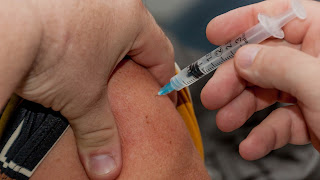We could soon have an albumin-based cancer vaccine that works well for cancer patients. Over the years, there's been ongoing hope for therapeutic cancer vaccines. Teaching our immune system to target tumors and prevent their return has seemed within reach. However, despite extensive research efforts, these vaccines have often fallen short of expectations.
 |
| Representational Image |
They've failed to stimulate a robust immune response, even in clinical trials. There has been a significant effort to enhance the effectiveness of cancer vaccines, noted Darell Irvine, a professor at MIT. About 15 years ago, Haipeng Liu, who was working with Irvine, found that peptide vaccines couldn't get to the lymph nodes in large enough amounts. This made the immune responses weak, limiting the effectiveness of cancer vaccines.
A Surprising Breakthrough.
Liu found something unexpected while testing micellar nanoparticles to deliver peptides. The loosely bound micelles that were used as a control actually triggered a strong immune response. This caught Irvine's attention. Liu kept studying and found a connection between how imaging dye behaves in lymph nodes and its interaction with albumin. Albumin is a protein that is very common in the blood and other bodily fluids.
The scientists found something important. They made a vaccine using tiny fat parts called lipid tails. These tails stick to small chains of proteins called peptides, which then attach to big molecules called albumin. It's like the peptides are catching a ride on the albumin. This new approach made the immune system's T cells respond much better. In tests with mice that had HIV, melanoma, or cervical cancer. The response was five to ten times better than with just peptides, as shown in their study from 2104.
Later on, the scientists looked more closely at their work. They found they could make the immune system respond even better. They combined the cancer-fighting vaccine with something called CAR T cell therapy. This combination was incredibly successful. In tests with mice, it got rid of 60% of solid tumors. This was a big deal because CAR T cell therapy usually only worked well for blood cancers like leukemia.
From laboratory experimentation to real-world wonder.
In 2016, Irvine and his team started Elicio Therapeutics. They wanted to turn their vaccine, which they tested in the lab, into a treatment for patients. The vaccine, called ELI-002, is made of albumin and combines peptides with something that boosts the immune system. This vaccine doesn't need CAR T cells.
In 2021, Elicio started a test called AMPLIFY-201. They were looking at cancers with changes in the KRAS gene, especially one called pancreatic ductal adenocarcinoma (PDAC). PDAC is hard to treat and spreads quickly. However, the ELI-002 vaccine might help because it could work against up to seven types of KRAS changes. This could help a lot of people with PDAC.
In 2024, the team shared results from the first part of the trial in a science journal called Nature Medicine. It gave hope for a new cancer treatment that might work really well.
They tested it on 25 patients. Most of them, about 84%, had more cells in their bodies that fight tumors. And for about 24% of patients, they couldn't find any signs of cancer left in their blood. Patients who had a strong reaction from their immune system had an 86% lower chance of their cancer coming back or getting worse. This suggests that the vaccine might help stop cancer from returning.
Christopher Haqq, who is the Executive Vice President, head of research and development, and chief medical officer at Elicio, shared a personal story with MIT News. He said, "I joined Elicio partly because my father had colorectal cancer with a mutation called KRAS."
Haqq explained, "Seeing my dad go through this experience made me realize how much we need better treatments for cancers with KRAS mutations. It gives me hope that we're moving in the right direction to help people like my dad and many others."
As Elicio moves forward with the PDAC clinical trial, the company plans to test its treatment to target cancers caused by KRAS mutations, such as colorectal and non-small cell lung cancers.







0 Comments
Kindly share your views